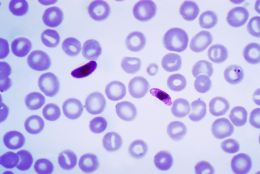Researchers make a key discovery in how malaria evades the immune system

The malaria parasite Plasmodium falciparum hijacks an immune system process to invade red blood cells, according to a study led by researchers at Penn State College of Medicine. Understanding how malaria invades the cells could lead to a more effective vaccine.
Malaria kills about 1 million people every year, mostly children under 5 in Sub-Saharan Africa. Only one vaccine has been licensed, and neither it nor any others in development today will be 100 percent effective against malaria infection, said lead researcher José A. Stoute, associate professor of medicine and microbiology and immunology, Penn State College of Medicine.
Immunologists have suspected that P. falciparum, the most deadly malaria parasite, uses several mechanisms to evade the human immune response and invade red blood cells. Stoute's team, along with colleagues at the Walter Reed Army Institute of Research and the PATH Malaria Vaccine Initiative, showed that the parasite uses an arm of the human immune response called the complement system to do so. They report their results online in the journal EBioMedicine.
The complement system is made up of proteins that aid—or complement—antibodies that fight infections. In a successful immune response, the production of antibodies against a pathogen triggers complement proteins to coat and kill the invader before it can cause harm.
But in the case of malaria infection, the researchers learned, the parasite turns this process on its head.
Hijacking of the immune system has been demonstrated before in other infectious diseases, such as dengue virus. Stoute and colleagues hypothesized that P. falciparum might use a similar tactic.
To test this, they first looked at the parasite in the test tube. In the presence of complement proteins, anti-malaria antibodies enhanced the growth of the parasite; when a complement was not present, the parasite did not grow as well.
Next, the researchers tested the idea using the mouse malaria parasite Plasmodium berghei. Mice that lacked a specific protein from the complement system had lower levels of the parasite in their red blood cells after being infected.
Exactly how antibodies and complements work together to encourage malarial infection is not yet clear.
The surface of a red blood cell is dotted with complement receptors, proteins that block the complement from entering the cell and attacking it.
"These complement receptors actually protect red blood cells from what we call self-attack," Stoute said.
The researchers observed the malaria parasite in contact with clusters of complement receptors on the surface of red blood cells as it was trying to invade.
"We suspect that when complement gets activated by antibodies, the malaria parasite gets coated with complement proteins that normally would kill it," Stoute explained. "Instead, complement proteins allow the parasite to bind to complement receptors on the red blood cell. That allows the parasite to actually stick to the cell and then proceed to get inside it."
Although researchers knew that certain other pathogens can hijack the complement system, this process had never before been shown in malaria.
"Our results contradict the dogma of what the complement system does, and will likely be subject to a lot of scrutiny," Stoute said. "Our findings suggest that development of an effective malaria vaccine that blocks red blood cell invasion is a more difficult task than initially thought. At the same time, we are now in a better position. By learning the malaria parasite's tricks, we may be able to bypass them." One strategy might introduce antibodies that are less likely to activate complement, Stoute said. Better treatments could also be developed, such as complement inhibitors for use in people with severe malaria.
"We need to continue to explore ways in which we can develop, ultimately, a nearly 100 percent effective malaria vaccine," he said.


















